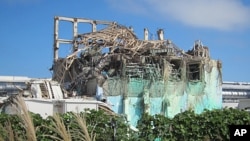The Japanese government has agreed to provide Tokyo Electric Power Company $11.5 billion in public funds to cover the costs in the aftermath of the March 11 earthquake and tsunami that crippled its Fukushima nuclear power plant.
Japan is providing government aid to help Tokyo Electric Power Company pay for the costs associated with decontaminating the Fukushima nuclear plant site, dismantling the reactors and handling billions of dollars in compensation claims to residents and business owners.
In return for government financial assistance, the utility is to slash operating costs by about $3 billion and shed more than 7,000 workers from its payroll - about 15 percent of its total staff.
Tokyo Electric announced Friday that it expects to lose nearly $7.5 billion for the current fiscal year (which ends in March). The power company says it will incur the loss even after receiving the more than $11 billion in public funds.
The deal for public funds comes amid calls for Tokyo to be more transparent about the level of nuclear radiation in Japan. A task force of the Washington D.C.-based Center for Strategic and International Studies (CSIS) is calling for Japan to resolve what it calls "outstanding safety issues" from the meltdown of reactors at the Fukushima-1 plant.
Three of the facility's nuclear reactors suffered meltdowns after a magnitude 9.0 earthquake and huge tsunami struck northeastern Japan on March 11.
J. Stephen Morrison, the director of global health policy at CSIS, says a task force representing the institute is urging the formation of an independent, international team to examine public health risks from long-term exposure to low-level radiation.
"We think there is a serious trust and credibility problem and that an independent entity of this kind, if it were something that were welcomed by the Japanese government, could advance and carry forward its work in 18 to 24 months and greatly advance our knowledge on those key areas," Morrison stated.
Morrison says Japan withheld key data during the early stage of the crisis. Recent estimates indicate radiation released at twice the levels of what had originally been acknowledged.
The country is also grappling with the discovery of radiation hot spots, as far away as Tokyo. And questions persist about the state of the nuclear fuel at the Fukushima plant.
The concern is that the goal of bringing the damaged reactors to a cold shutdown state by the end of this year could be delayed.
Nuclear radiation from the plant in mid-March forced the evacuation of communities in a 20-kilometer radius around the facility. Fully decontaminating the area is expected to take decades.
Despite the nuclear disaster, the report from the CSIS task force released Thursday in Washington notes Japan may have little choice but to continue to rely on atomic power as a relatively inexpensive energy source because the country has few natural resources.
Tim Adams is managing director of an economic advisory firm, The Lindsey Group, and is a former U.S. Treasury Department undersecretary.
"There's real concern among Japanese industry that if Japan moves to a different energy source and it is less cost-effective then that will force Japanese industry to move jobs to other platforms around the world," he said.
Besides health and energy issues, the CSIS report also offers recommendations to Japan on disaster preparedness, its economy and civil society. It calls for Tokyo to liberalize trade and to cut or adjust tax rates to reduce the fiscal pressures compounded by the March 11 disaster. CSIS estimates the quake and ensuing tsunami dealt a $220 billion blow to Japan's infrastructure and assets.
There has been no immediate reaction to the suggestions from the Japanese government.




